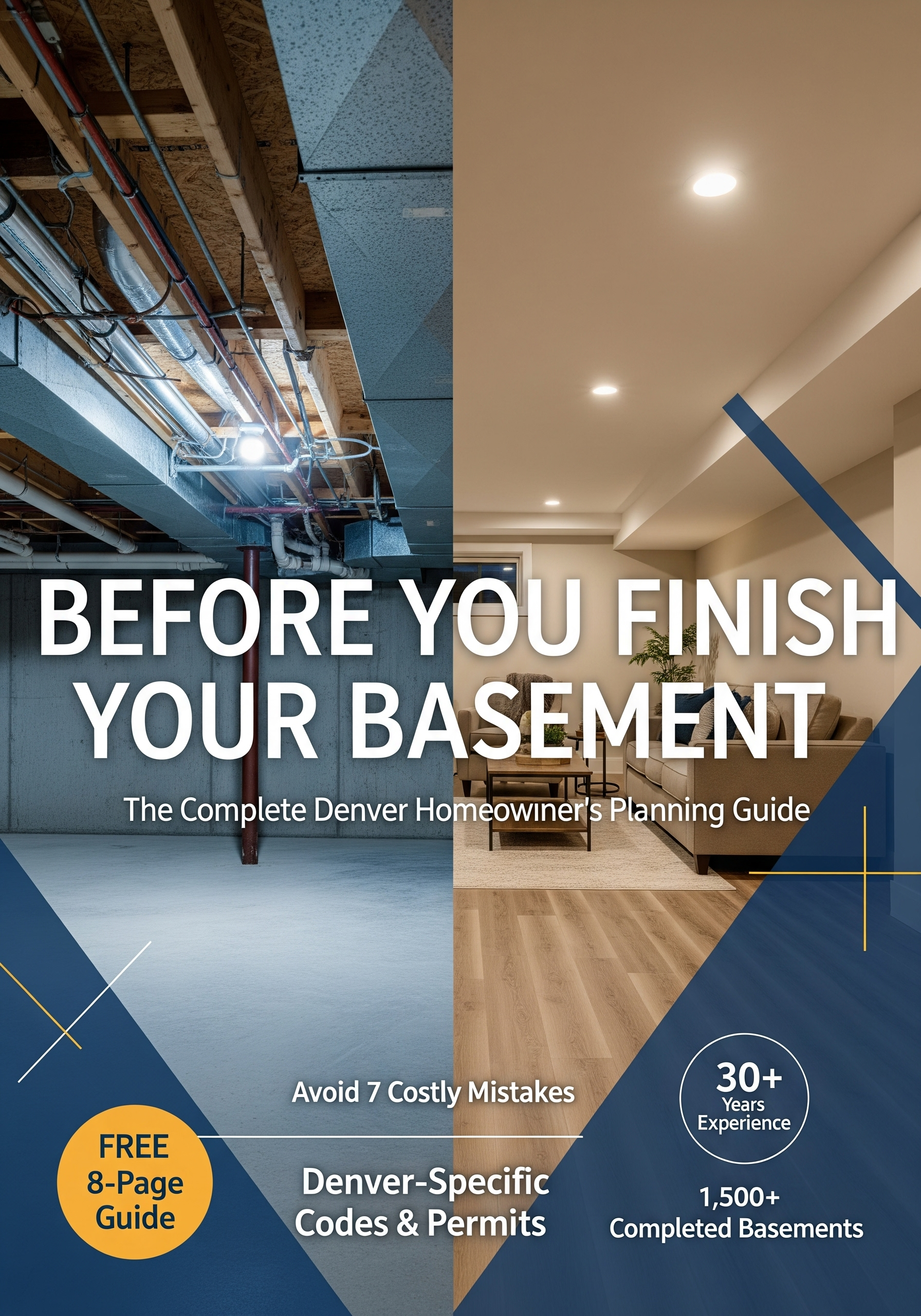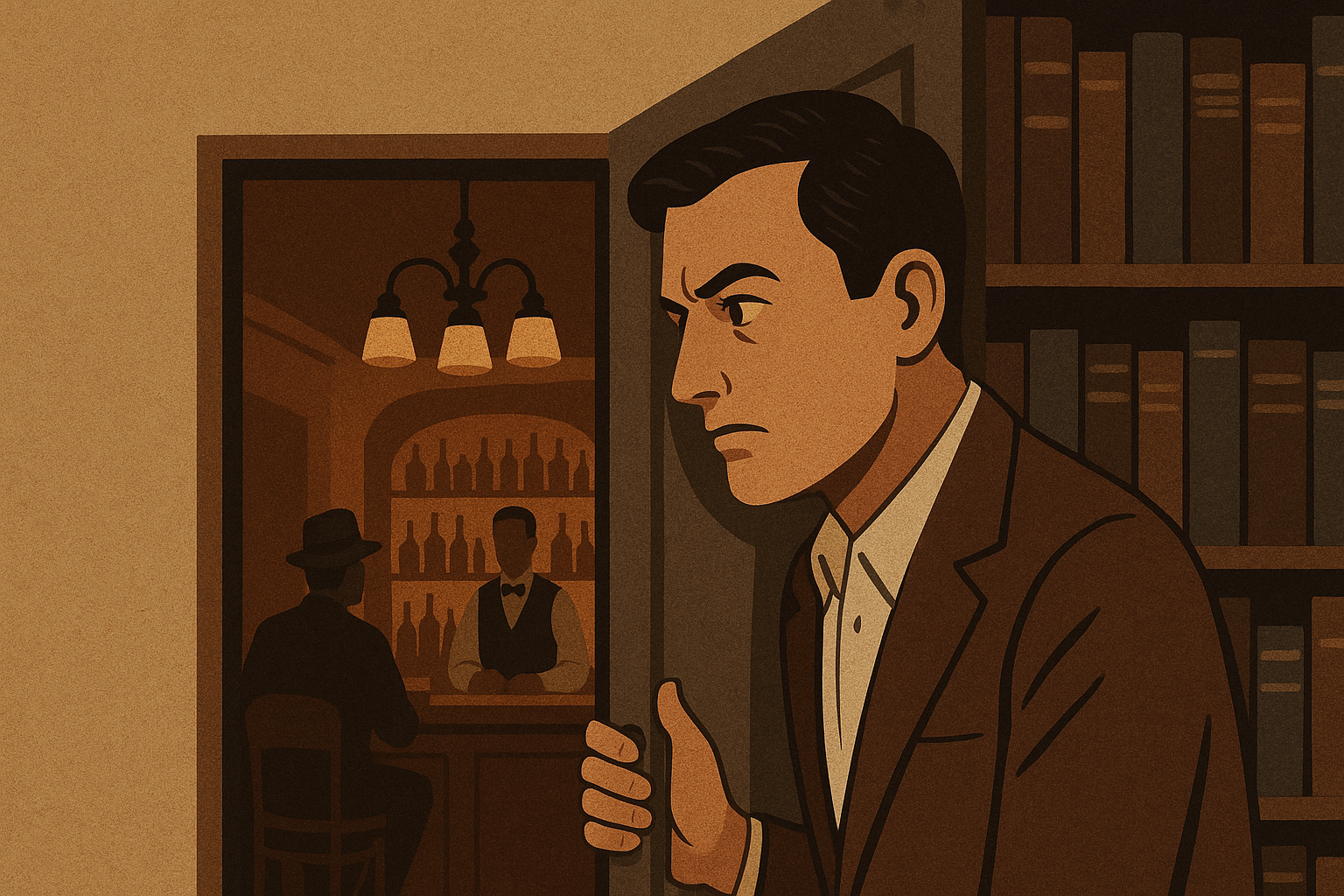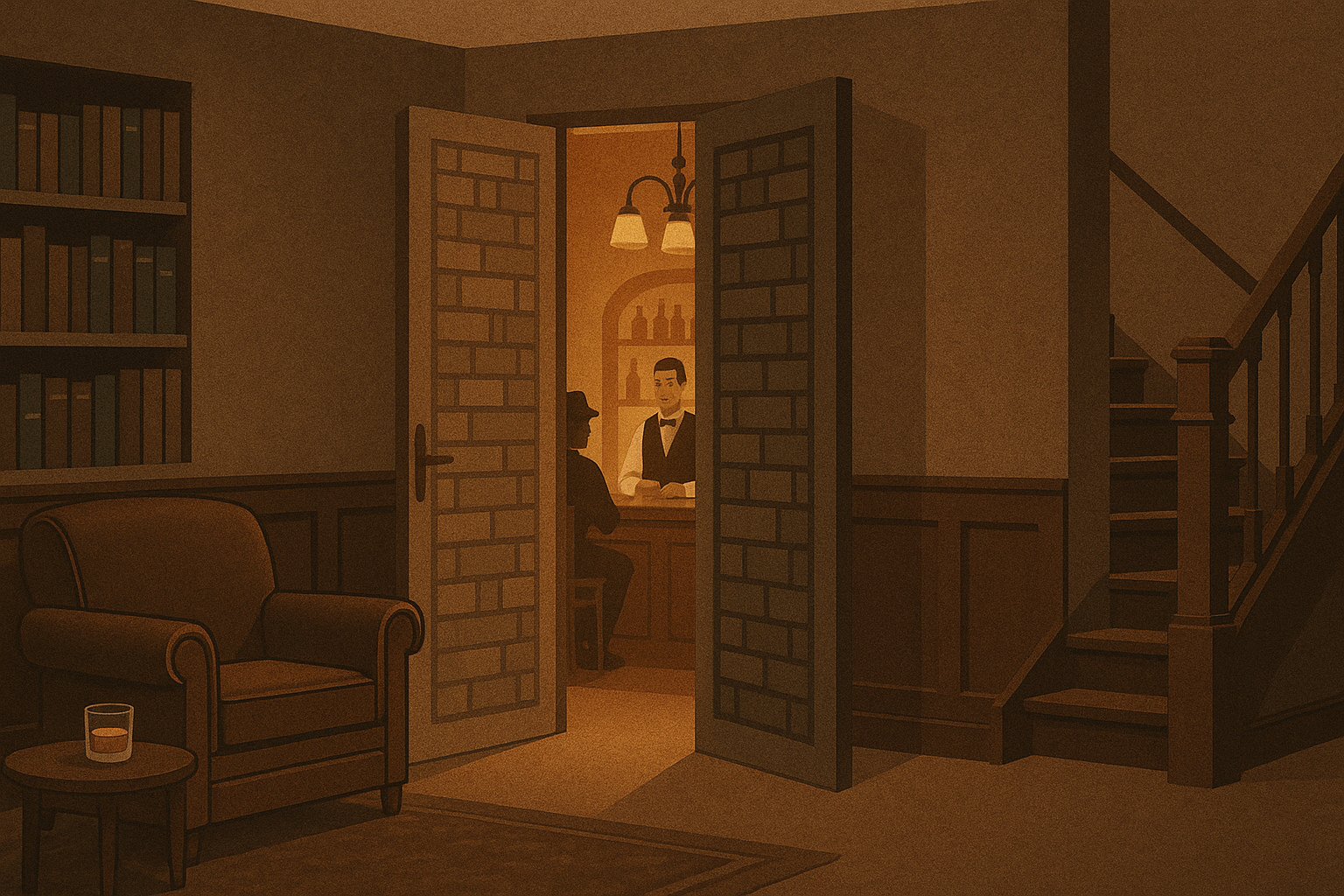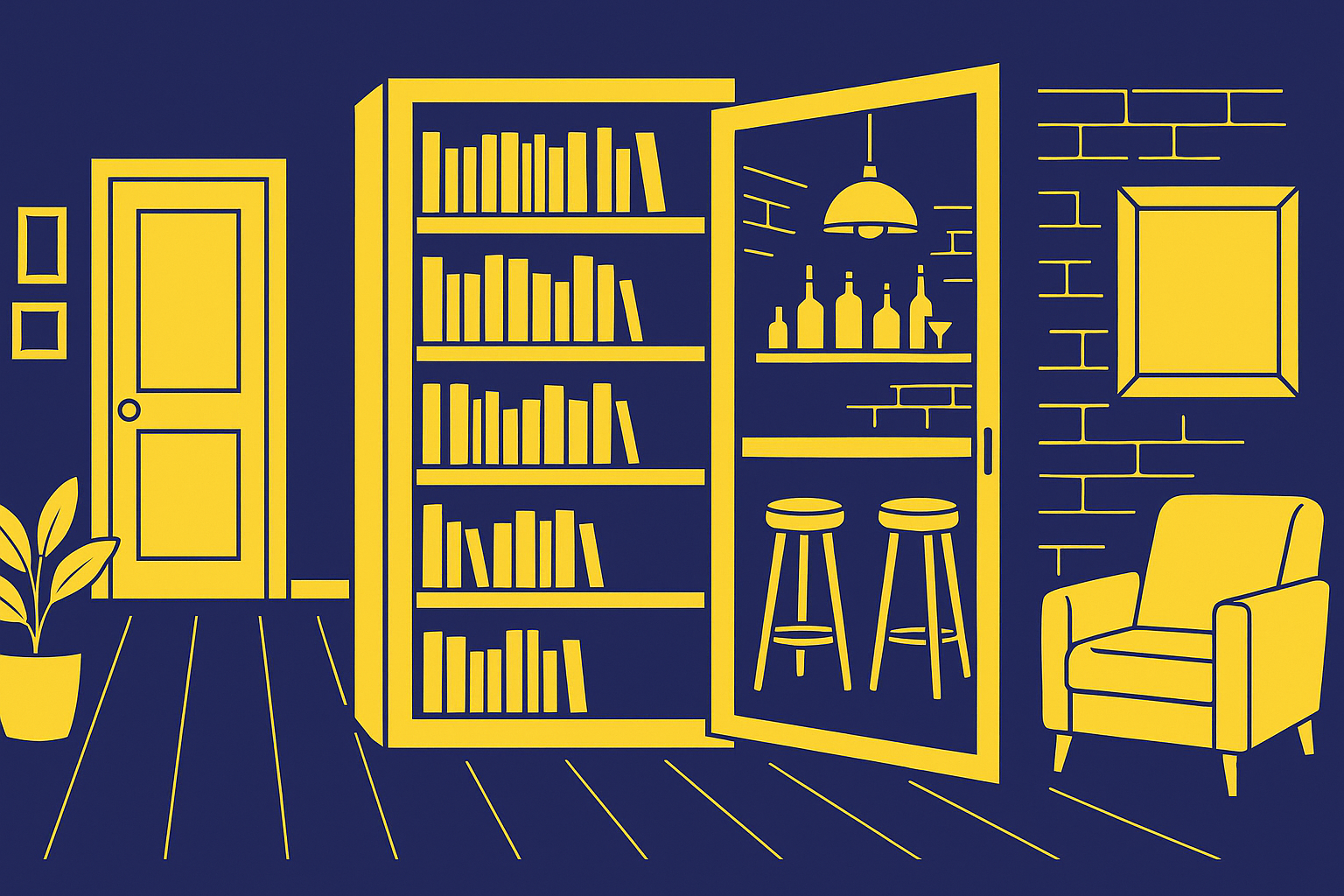The Psychology Behind Hidden Rooms: Why Speakeasies Are Trending
The Psychology Behind Hidden Rooms: Why Speakeasies Are Trending
In an age of open-concept living and transparent social media lives, there's something deeply appealing about having a secret. Hidden rooms and speakeasy-style basements aren't just design trends – they're psychological responses to our modern world. Let's explore why more homeowners are choosing to create mysterious, concealed spaces in their homes.
The Universal Appeal of Secrets
Evolutionary Roots
Humans have always been drawn to hidden spaces. From ancient cave dwellings to medieval castle passages, concealed areas have served crucial survival functions:
- Safety and Security: Hidden spaces provided protection from threats
- Resource Storage: Valuable items could be kept secret from raiders
- Strategic Advantage: Concealment offered tactical benefits
- Privacy Needs: Personal space away from community scrutiny
These evolutionary drives haven't disappeared – they've evolved into modern psychological needs that secret rooms can fulfill.
The Modern Appeal: What Secret Rooms Provide
1. Psychological Ownership and Control
In today's world, we often feel like we have little control over our environment. Secret rooms provide:
- Complete autonomy over a private space
- Freedom from external judgment about décor or activities
- Personal retreat from family and social obligations
- Sense of mastery over one's environment
"Having a secret room is like having a secret self – it's a space where you can be completely authentic without any external pressures." - Environmental Psychologist Dr. Sally Augustin
2. The Thrill of Exclusivity
Secret rooms tap into our desire for exclusivity and special experiences:
- VIP Mentality: Being "in the know" feels special
- Curated Experiences: Controlling who gets access
- Social Currency: Having something unique to share
- Personal Achievement: Creating something extraordinary
3. Escape from Digital Overwhelm
In our hyperconnected world, secret rooms offer digital detox opportunities:
- Physical boundaries that separate work from relaxation
- Reduced screen time in intentionally analog spaces
- Mindful design that encourages present-moment awareness
- Sensory experiences that ground us in physical reality
The Speakeasy Phenomenon: More Than Just Nostalgia
Historical Romance
The 1920s represent freedom, rebellion, and sophistication in popular culture:
- Jazz Age Glamour: An era of cultural innovation and artistic expression
- Prohibition Romance: The allure of forbidden pleasures
- Social Revolution: Breaking free from Victorian constraints
- Economic Prosperity: A time of optimism and excess
Modern Parallels
Today's speakeasy trend reflects similar desires:
- Rebellion against minimalism: Rich, maximalist design after years of stark interiors
- Desire for craftsmanship: Hand-made details in a mass-produced world
- Social intimacy: Small, cozy gathering spaces versus large, impersonal venues
- Authentic experiences: Real materials and genuine craftsmanship
Psychological Benefits of Hidden Spaces
1. Stress Reduction and Mental Health
Secret rooms can significantly impact wellbeing:
- Cortisol Reduction: Private spaces lower stress hormones
- Parasympathetic Activation: Hidden retreats trigger relaxation responses
- Boundary Setting: Physical barriers support emotional boundaries
- Restoration: Quiet spaces allow mental recovery
2. Enhanced Creativity and Focus
Hidden workspaces boost cognitive performance:
- Reduced Distractions: Physical separation from household chaos
- Mental Priming: Special spaces prime creative thinking
- Flow States: Dedicated environments support deep work
- Identity Expression: Personal spaces reflect and reinforce identity
3. Relationship Benefits
Counterintuitively, secret personal spaces can improve relationships:
- Individual Restoration: Personal time improves partnership quality
- Reduced Conflict: Separate spaces prevent territorial disputes
- Shared Excitement: Secret rooms become relationship adventures
- Communication Enhancement: Thoughtful space planning requires discussion
The Social Media Effect
Curated vs. Authentic Living
Social media has created pressure for perfect, photogenic homes. Secret rooms offer:
- Authenticity: Spaces that don't need to be Instagram-ready
- Privacy: Areas free from social media documentation
- Personal Truth: Décor that reflects genuine preferences
- Imperfection Permission: Spaces that can be messy or unfinished
The Experience Economy
Modern consumers value experiences over possessions. Secret rooms provide:
- Memorable Moments: Dramatic reveals and discoveries
- Story Creation: Narrative elements for personal history
- Guest Experiences: Unique entertainment opportunities
- Adventure at Home: Exploration without travel
Who's Creating Secret Spaces?
Demographic Trends
Our research shows specific groups driving the hidden room trend:
Millennials (Ages 28-43)
- Seeking authenticity in an increasingly digital world
- Valuing experiences and uniqueness over traditional status symbols
- Working from home and needing dedicated workspace boundaries
- Drawn to historical aesthetics as counterpoint to modern minimalism
Gen X (Ages 44-59)
- Establishing long-term family homes with personalized features
- Having disposable income for luxury home improvements
- Nostalgia for pre-digital era experiences and craftsmanship
- Desire for sophisticated entertainment spaces
Empty Nesters (Ages 55+)
- Repurposing children's spaces for adult interests
- Investing in home improvements for aging-in-place
- Seeking hobby and interest-focused spaces
- Valuing quality craftsmanship and lasting investments
The Technology Integration Paradox
High-Tech Hidden Spaces
Modern secret rooms often blend historical aesthetics with contemporary technology:
- Smart Home Integration: Hidden rooms with app-controlled access
- Modern Comfort: Climate control and advanced lighting systems
- Entertainment Technology: Concealed TVs and sound systems
- Security Systems: Monitoring and access control
Analog Experiences in Digital Spaces
Despite technology integration, secret rooms often emphasize analog experiences:
- Physical Books: Real libraries in digital reading age
- Board Games: Tangible entertainment versus screen-based
- Handcrafted Cocktails: Artisanal experiences versus convenience
- Face-to-Face Conversation: Intimate spaces for genuine connection
Psychological Design Principles
Creating Meaningful Hidden Spaces
Successful secret rooms incorporate specific psychological design elements:
Transition Rituals
- The act of opening the secret door creates mental shift
- Physical crossing of threshold signals space change
- Lighting changes reinforce psychological transition
- Sound dampening creates acoustic separation
Sensory Engagement
- Rich textures engage touch and create comfort
- Warm lighting affects mood and relaxation
- Ambient sounds or music enhance atmosphere
- Signature scents create memory associations
Personal Symbolism
- Collections and memorabilia reflect identity
- Color schemes that resonate personally
- Furniture that has emotional significance
- Art that inspires or comforts
The Future of Hidden Spaces
Evolving Psychological Needs
As our world continues to change, secret rooms will adapt to meet new psychological needs:
- Climate Change Anxiety: Spaces that feel secure and self-sufficient
- Urban Density: Private retreat from increasing population density
- Work-Life Integration: Flexible spaces that serve multiple functions
- Aging Population: Accessible hidden spaces for mobility challenges
Design Evolution
Future secret rooms will likely feature:
- Biophilic Design: Natural elements for psychological wellbeing
- Sustainable Materials: Environmentally conscious construction
- Flexible Configurations: Spaces that adapt to changing needs
- Wellness Integration: Design elements specifically for mental health
Making It Personal
Questions to Consider
Before creating your secret space, consider these psychological factors:
-
What am I seeking to escape from?
- Work stress, family chaos, social pressure?
-
What activities make me feel most authentic?
- Reading, crafting, music, conversation?
-
What time period or aesthetic resonates with me?
- Victorian, Art Deco, Modern, Industrial?
-
How do I want to feel in this space?
- Energized, relaxed, creative, social?
-
Who will I share this space with?
- Partner, friends, children, or keep it private?
The Deeper Meaning
Secret rooms and speakeasy spaces represent more than just cool home features – they're responses to fundamental human psychological needs. In a world that often feels chaotic, transparent, and overwhelming, hidden spaces offer:
- Control in an uncontrollable world
- Privacy in an over-exposed society
- Authenticity in a curated culture
- Intimacy in an increasingly distant world
- Adventure in routine daily life
As we continue to navigate modern challenges, the appeal of secret spaces will likely grow. They represent not just design trends, but psychological solutions to contemporary living challenges.
Whether you're drawn to the romance of a hidden speakeasy, the mystery of a secret door, or simply the idea of a space that's entirely your own, you're tapping into something deeply human – the need for a place where you can be completely yourself.
Interested in creating your own psychological retreat? Contact Affordable Basements to discuss how we can design a secret space that meets your unique emotional and functional needs.

Before You Finish Your Basement
Download our comprehensive free guide trusted by 1,500+ Denver homeowners. Avoid costly mistakes and plan your transformation like a pro.


